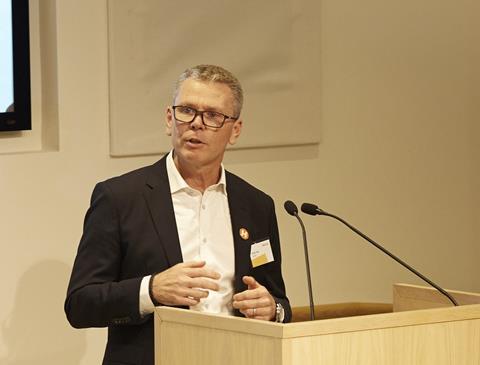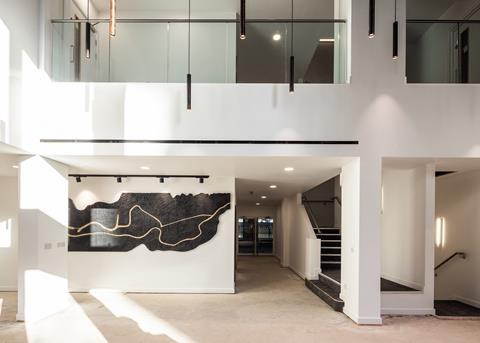The consultancyŌĆÖs chief executive is confident that the sustainability agenda in northern Europe holds the key to the future despite TrumpŌĆÖs war on climate change policies. Carl Brown reports

Are we now living in a post-globalised, post-liberal age? The past few weeks have seen Donald Trump turn the established world order on its head, attacking the principles of global free trade through import tariffs and rolling back diversity and inclusion programmes in government.
The US president is certainly shaking things up. He is also seeking to axe dozens of environmental regulations and taking action to remove any mention of the climate crisis.
To what extent will Europe eventually follow suit? Andy Hay, chief executive of ┬Ż54.5m-turnover consultant Hollis Global, is reasonably confident this will not be the case ŌĆō when it comes to the sustainability agenda at least.
ŌĆ£I donŌĆÖt think this is going to lead to European legislation or regulation stepping back. A lot of the drive for sustainability is coming from the European Union framework and I donŌĆÖt see that changing. I think sustainability will stay a high priority. In fact, I think it will become more in demand,ŌĆØ he says.
Hay will certainly hope so, given the emphasis he is putting on European work and sustainability as part of a plan to double the size of HollisŌĆÖ turnover to ┬Ż100m over five years.
We join Hay on Teams for his first interview since taking charge last year to talk about what this strategy consists of ŌĆō and about his career to date during a turbulent time for construction.
Hay kicks off by attempting to define what Hollis is. ŌĆ£Some people describe us as a ŌĆśreal estate consultancyŌĆÖ, I do not particularly subscribe to that,ŌĆØ he says. For the record, HollisŌĆÖ own corporate website describes the company in this way, albeit stressing its independence.
ŌĆ£We donŌĆÖt do things like investment management, we donŌĆÖt do leasing, we donŌĆÖt do property management. At our heart, we are technical advisors on anything to do with the fabric of the building, machinery of the building, or environment of the building.ŌĆØ
ANDY HAY: CV
2024-present Chief executive, Hollis
2019-24 Managing director, Europe, Middle East and Africa, Colliers
2019-20 Director, T4G Consultancy
2012-19 Managing director, Europe, Middle East and Africa, CBRE
2006-12 Managing director, CBRE
2002-05 Group business development director, RAC
1998-2002 Finance director, Lex Vehicle Leasing
1992-98 Director, Diageo
1988-92 Financial controller, Adidas
For Hay, the fact that Hollis is an employee-owned trust and can operate independently of investors is a core part of its USP. ŌĆ£We will never have to do a piece of technical due diligence in support of a deal, in order to make a deal happen,ŌĆØ he says.
ŌĆ£We can be absolutely independent and give our view on the asset. I hear that quite frequently from clients ŌĆō that they come to us because we are not backing the deal.ŌĆØ
Hollis offers 28 different activities which Hay groups into distinct categories, namely services that support project management and development; those that support buying and selling of properties, including technical due diligence; services during the occupation of buildings, including dilapidations and service charges; and its consultancy business which is all about sustainability and innovation.
Getting the right offer for clients around sustainability is going to be critical for us
The latter, which currently accounts for around 10% of the firmŌĆÖs income, is ŌĆ£inevitablyŌĆØ the fastest growing. ŌĆ£Getting the right offer for clients around sustainability is going to be critical for us,ŌĆØ Hay adds.
Simply producing a one-off report on, for example, the sustainability of a building is no longer enough for clients. ŌĆ£Information is now consumed as the information is available over time, as intelligence is available,ŌĆØ he says.
The key thing is that Hollis looks to help clients ŌĆō who include large institutional funds and high net-worth investors ŌĆō practically implement recommendations to improve sustainability of buildings, rather than producing a passive report. ŌĆ£We are investing quite a lot of money in technology to ensure the recommendations can then happen. Clients are saying, ŌĆśWe like thisŌĆÖ,ŌĆØ he says.
For Hay, the fact that Hollis is relatively small means it is nimble enough to provide these joined-up services: ŌĆ£You imagine, we do a technical due diligence on an acquisition on the way in. The client buys it and then it typically transfers from the investment fund manager to the asset manager.
ŌĆ£We can then follow up with the asset manager and say, ŌĆśWe can now help you manage this asset, because in the report that we produced it said you need to do these three things and here is the prioritisationŌĆÖ.ŌĆØ

Hay adds: ŌĆ£I think the scale and the culture at Hollis allows us to do that in a way that itŌĆÖs harder to do at larger, multi-disciplinary, big real estate consultancies.ŌĆØ
So Hollis is big enough to be relevant, but small enough ŌĆō with 500 staff ŌĆō to mean Hay can ŌĆ£get his armsŌĆØ around the business.
Although around 85% of its staff are currently in the UK, Hollis operates in four other countries: Ireland, the Netherlands, Spain and Germany. ItŌĆÖs European business accounts for around 9% of current annual turnover.
ŌĆ£We have provided services in pretty much all of the northern European countries, [but] we need to turn that from one or two opportunities into a more systematic, more robust business that goes out and wins business,ŌĆØ Hay says.
He seems particularly animated about the potential for growing in Germany. The group is active in Berlin, but is ŌĆ£sub-scaleŌĆØ and wants to grow rapidly, with potential opportunities in other cities including Frankfurt and Munich.

Acquisitions of either businesses or simply a ŌĆ£team grabŌĆØ, whereby Hollis will recruit individuals, could be part of the strategy to expand into Germany and other parts of northern and western Europe. Hay knows Germany well, having lived there for a number of years while working as a financial controller at Adidas in the latest 1980s and early 1990s. He is fluent in the language, which would surely come in handy for doing business there.
While he is casting his eyes across the English Channel and North Sea towards opportunities on the continent, Hay is also not short of opinions on the domestic UK market. Of the Labour government, he says he wants ministers to announce policies to make it easier for firms to hire apprentices or graduates through some kind of tax break.
Everyone understands the need for new regulation, especially around building safety, but there is immense frustration about turnaround times
ŌĆ£Hollis loves bringing apprenticeships in, running internships, but make it easier for us to do that. Allow us to put funds into that, give us some kind of a break if we do that kind of stuff,ŌĆØ he says.
He shares the immense frustration felt by many in the industry about delays to approvals of high-rise buildings by the building safety regulator (BSR). ŌĆ£I think everyone understands the need for new regulation, especially around building safety, but there is immense frustration about turnaround times,ŌĆØ he says.
It is obvious from speaking to Hay that he is anxious to grow the business and passionate about developing and providing services to meet clientsŌĆÖ needs. He says he learnt about the importance of this earlier in his career, before he joined real estate and construction.
HayŌĆÖs journey into the industry is certainly an unusual one. He studied business and French studies at Loughborough University, where he captained the athletics club despite not being a sports student ŌĆō something he admits he is still ŌĆ£very proud ofŌĆØ.

He joined the graduate scheme at International Computers Ltd (ICL) before it was bought by Fujitsu, and qualified as an accountant. He then joined Adidas and worked for six years as a director at the predecessor firms of multinational drinks giant Diageo, becoming the chief financial officer of the businessŌĆÖ operations in northern Europe.
But it was a move to join Lex Vehicle Leasing that ŌĆō oddly ŌĆō led to Hay entering the construction and property industry. ŌĆ£It was asset-backed finance,ŌĆØ he explains. ŌĆ£At the heart of it was a vehicle ŌĆō an asset that needed to be bought, needed some special fit-out, needed to be insured, needed to be fixed when it broke down, needed then to be renovated and could be resold.ŌĆØ
When described like this, the similarities between looking after cars and looking after buildings are more obvious than might be thought. Hay was spotted and recruited to join CBRE, where he worked for 13 years, followed by a four-year stint in property management for real estate firm Colliers before joining Hollis last year.
Europe, then, has been a key part of HayŌĆÖs career and life and he is looking to it again to grow Hollis in the face of global market turmoil and uncertainty. The uncertainty that surrounds TrumpŌĆÖs tariffs plans ŌĆ£makes it harder to value an asset and makes it more difficult when choosing where and when to investŌĆØ.
There will be a period of adjustment, Hay predicts. He hopes the EUŌĆÖs commitment to sustainability remains rock solid so that Hollis can expand by leveraging its USP.
ŌĆ£The real value add ŌĆō making assets, improving assets, improving tenantsŌĆÖ experience of assets, all of that from an independent background ŌĆō thatŌĆÖs the heart of what Hollis is about,ŌĆØ he concludes.























No comments yet